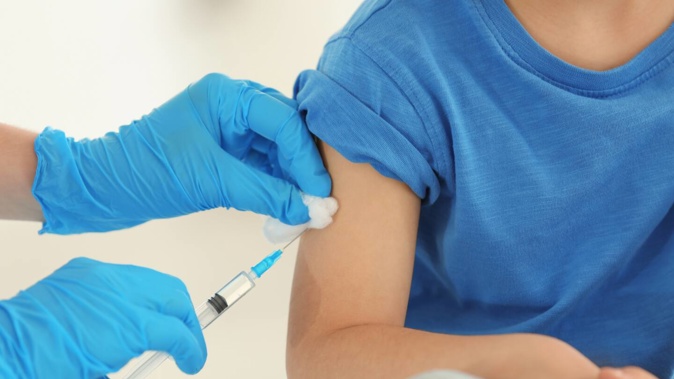
Health and Human Services Secretary Robert F. Kennedy jnr said on Tuesday that his agency would no longer recommend the coronavirus vaccine for healthy pregnant women and healthy children – an unprecedented move that bypasses the traditional system of vaccine advice from the Centers for Disease Control and Prevention.
In a 58-second video posted on X, Kennedy said the vaccine had been removed from the CDC’s immunisation schedule for those two groups of people.
“I couldn’t be more pleased to announce that as of today the Covid vaccine for healthy children and healthy pregnant women has been removed from the CDC recommended immunisation schedule,” Kennedy said.
“Last year the Biden administration urged healthy children to get yet another covid shot despite the lack of any clinical data to support the repeat booster strategy in children.”
The move reflects ongoing tension between Kennedy’s health department and public health experts who have expressed deep concern that the nation’s health chief and his top deputies are undermining public confidence in vaccinations. It also shows the extent to which Kennedy, founder of a prominent anti-vaccine group, is willing to circumvent career officials and traditional practices at the nation’s health agencies.
The CDC recommends everyone 6 months and older receive the coronavirus vaccine annually. The recommendation is based in part on evidence that a significant share of infants and young children hospitalised with Covid have no underlying conditions. The virus also can cause complications during pregnancy.
CDC officials were not informed in advance of Kennedy’s decision, according to a former agency official who spoke on the condition of anonymity for fear of retribution.
Although the HHS secretary has the authority to modify vaccine recommendations, his action raises questions about insurance coverage for the shots, vaccine experts said. The law requires insurers to cover vaccines recommended by the CDC’s vaccine advisory panel with no out-of-pocket cost to consumers.
“I would say it’s a legal gray area,” said Richard Hughes IV, a former vice-president of public policy at coronavirus vaccine manufacturer Moderna, who teaches vaccine law at George Washington University Law School.
Affordability and vaccine uptake could be affected if insurers withdraw coverage for vaccination of people not on the recommended list or require out-of-pocket costs, he said.
The CDC estimates that 13% of eligible children and 14.4% of eligible pregnant women received the latest version of the coronavirus vaccine.
Kennedy has a lengthy history of disparaging vaccines. He has targeted the coronavirus shot in recent years, falsely calling it the “deadliest vaccine ever made”. Kennedy has countered that he is simply seeking good data about vaccines before recommending any shots.
At a congressional hearing this month, Kennedy was asked whether he’d vaccinate his children against measles. “I don’t think people should be taking medical advice from me,” Kennedy replied.
Kennedy was flanked in Tuesday’s video by Food and Drug Administration Commissioner Marty Makary and Jay Bhattacharya, head of the National Institutes of Health. The social media post did not offer a detailed explanation of the move.
“There’s no evidence healthy kids need it today, and most countries have stopped recommending it for children,” Makary said. The World Health Organisation, Australia and the United Kingdom do not recommend routine coronavirus vaccination for children.
“We’re now one step closer to realising President Trump’s promise to ‘Make America Healthy Again’,” Kennedy said.
Georges C. Benjamin, longtime executive director of the American Public Health Association, said the administration had been telegraphing this move for some time, but criticised officials for not providing data to support their conclusions.
“Are they making this decision without going to any of their advisory committees?” Benjamin said. “Show us the evidence, the studies that have been done. … I don’t know of any.”
Last week, the FDA released a framework for narrowing its approval for updated coronavirus vaccines to adults 65 and older, and people with at least one health condition that puts them at high risk for severe disease. The move marked a significant shift in the agency’s approach to green-lighting the annual shots traditionally offered each fall.
Kennedy’s announcement on Tuesday appeared to be partly at odds with the FDA’s new guidance for approving updated coronavirus shots. In a New England Journal of Medicine article last week, Makary and Vinay Prasad – the FDA’s top vaccine regulator – wrote that the agency would approve updated shots for people with at least one medical condition that puts them at higher risk of severe illness, according to the CDC. The article included “pregnancy and recent pregnancy” as one such condition.
The CDC has said pregnant women are more likely to become very sick from the coronavirus and are at increased risk of pregnancy complications, including preterm birth and stillbirth.
The American College of Obstetricians and Gynaecologists said it was “concerned” and “extremely disappointed” by the move.
“As ob-gyns who treat patients every day, we have seen first-hand how dangerous Covid infection can be during pregnancy and for newborns who depend on maternal antibodies from the vaccine for protection,” Steven J. Fleischman, the president of ACOG, said in a statement.
Sean O’Leary, chair of the American Academy of Paediatrics Committee on Infectious Diseases, said the decision “bypasses a long-established, evidence-based process used to ensure vaccine safety,” while also ignoring the input of independent medical experts.
“By removing the recommendation, the decision could strip families of choice,” O’Leary said in a statement. “Those who want to vaccinate may no longer be able to, as the implications for insurance coverage remain unclear. It’s also unclear whether health care workers would be eligible to be vaccinated.”
Federal health officials had already been considering whether to limit recommendations for a coronavirus shot to older adults and high-risk individuals. The change was set to come from the CDC after its vaccine advisory panel meets next month.
More than five years after the coronavirus emerged as a global health threat, health experts say many more Americans have protection against the virus, either through natural infection or multiple vaccinations. While the virus still causes significant health effects for certain individuals, Covid-19 is now less deadly to the US public.
Vaccination is designed primarily to reduce the risk of severe outcomes. Research that supports annual vaccination to reduce the risk of infection and transmission is limited.
Some scientists and public health officials have argued that annual shots benefit public health, even without randomised annual trials to bolster the case, because of data demonstrating the safety of the vaccine design and evidence pointing to its benefits.
Between October 2022 and April 2024, 59% of children hospitalised with Covid had at least one underlying condition, according to the CDC. But a little more than half of children between the ages of 6 months and 23 months admitted to intensive care for Covid had no underlying conditions. That demonstrates the need to recommend updated vaccines for all children, according to public health experts who back that approach.
Studies also have shown vaccination reduces the risk of lasting complications known as long Covid, which is less common in children.
Once a vaccine is approved or authorised by the FDA, the CDC’s vaccine panel meets and weighs extensive evidence about safety, effectiveness and other data to determine the best recommendation for who should receive the vaccine, when and how often.
The panel – the Advisory Committee on Immunisation Practices – sends its recommendations to the CDC director. Once the director signs off, the recommendations become official policy, and insurance companies are required to cover the vaccines with no out-of-pocket costs to consumers.
The CDC has no permanent director, raising questions about who is empowered to sign off on vaccine recommendations. Susan Monarez, who had previously been acting director, is awaiting Senate confirmation.
The Department of Health and Human Services did not respond to questions about why the department bypassed the CDC. In a statement, spokesman Andrew Nixon said that “with the COVID-19 pandemic behind us, it is time to move forward”.
Hughes, the vaccine policy expert, said Kennedy’s action was the first time an HHS secretary has unilaterally altered an existing recommendation from the advisory committee and the CDC.
Margot Taylor, a mother of three young children in Chicago, said she has already faced challenges getting coronavirus shots for her children because pharmacies in her state do not provide them to toddlers, and doctors don’t always have them. When she called her paediatrician’s office last week, she was advised the office was not providing the latest version of the vaccine and is awaiting guidance from the federal Government.
Taylor is also watching with anxiety because her daughter turns 6 months old in September. Her children also have elderly grandparents the family wants to keep safe.
“Any kind of illness in very young kids can be difficult and challenging for a family,” Taylor said.
Take your Radio, Podcasts and Music with you









